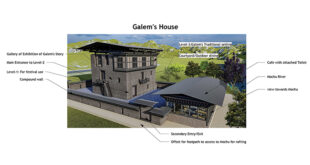A draft guideline for eco-tourism in the Protected Areas, which is being developed by Coastas Christ, one of the world’s leading sustainable tourism experts, will take another month
A strong link exists between tourism and Protected Areas (PAs). While eco-tourism can make significant financial contributions to a country’s economy, there are also examples of unsustainable tourism development. Since tourism to PAs is at its infancy, Bhutan has the opportunity to learn from the mistakes of others and capitalize on sustainable and responsible tourism.
This is the rationale behind the draft guideline for eco-tourism in the Protected Areas (PAs) being developed by Coastas Christ, one of the world’s leading sustainable tourism experts who is currently in the country to help the Nature Recreation and Eco-tourism Division (NRED).
The guideline which will take another month’s time will help sustain tourism in the country.
Coastas Christ said any country that has PAs need to have standards and guidelines for how development and visitation will take place in those PAs. “If you don’t have standards and guidelines, you run the chance of a chaotic approach to any type of development within a PA,” he said.
The guideline has six sections including tourism in PAs, Government Reserve Forest and Conservation Areas (CAs); introducing guidelines for Tourism in these areas; guidelines for eco-tourism planning and management; guidelines and regulations for specific stakeholder groups and monitoring and implementation strategy.
The Chief Forest Officer with NRED, Karma Tshering (PhD) said that the major challenge as of now is sustainability. “We have all the resources required for operating eco-tours, it is now ultimately how we put it in perspective for implementation on ground,” he said.
Also, in a small country like Bhutan, tourism is not confined to one sector. It is a combination of so many sectors both government and private. The challenge is coordinating all these sectors effectively to work towards the tourism vision of the country, he added.
Coastas Christ said it will be critically important for Bhutan to have clear standards and guidelines for true eco-tourism. True eco-tourism, means responsible travel to the natural areas which would help protect those areas for future generations and contribute directly to employment and economic opportunities for communities in that area. Sustainable tourism principles will be a key to having a successful PA management system, he said.
He also cited an example from Greece.
In the last 24 months, Greece has attracted 1.5 million more travelers. This sounds like the country’s tourism industry is booming when the fact of the matter is that while tourists numbers have increased, revenue contribution has declined dramatically.
“This is a very serious problem for a country. I think Bhutan should look at these issues so as it brings in more tourists it doesn’t get lower economic benefits,” he said.
The term eco-tourism was defined officially in 1991 with the establishment of International Eco-tourism Society. It is defined as responsible travel to natural areas that protects nature and cultural heritage and sustains the wellbeing of the local people economically.
It has been 20 years since the term found its definition.
“There are experiences and lessons from dozens of countries and hundreds of case studies. So Bhutan is very fortunate because it is opening up to tourism at a time when it can learn from the lessons and mistakes of other destinations,” said Coastas Christ, “Those standards and guidelines for eco-tourism in Bhutan reflect more than 20 years of eco-tourism development work in countries around the world with hundreds of PAs,” .
Asked how the guidelines can be implemented and not just die as a ‘paper tiger,’ he said, “You can bring a horse to the water but you cannot force the horse to drink. Any country that invests in the hard work to create good guidelines and standards that reflect the global collective knowledge on how tourism can be done will benefit. A country that ignores its own advice runs a great risk.”
Bhutan has a total of 51% protected areas till date.
 The Bhutanese Leading the way.
The Bhutanese Leading the way.




The ministers of Bhutan are only good at corruption eg like gyelposhing case……. Since the time of ruppee problem… the TCB and DPT is dying hard to promote tourism in the name of GNH to earn foreign had currency.. But what eco-tourism we are talking about,,, there is no economy and no ecology in bhutan… Look at gomtu, pasakha, bjemina, everywhere it is minning, cement, limestone, marble, tunnels, dams,,,, cut forest trees,,,, light forest fires to create more land for settlements by bad govt people..
hi yangzom it is a fact that only 0.03% of land in Bhutan is leased to mining companies so it could not be true that everywhere there is mining activity in the country. it is true that there is a fair amount of concentration in certain areas but this is in the hand of the govt as they are the ones who gives the final approval. Intact the current Rs crisis has shown that we have too little goods to sell to India which is mainly produced by the industrial and the mineral industry. The Rs crisis strongly shows that we may need to increase these activities otherwise we as a nation will suffer and all of us will have to face this pain. So in the end this is our choice economic crisis or more economic activities?
bhutan do not need to learn form other countries in eco-tourism. it already has it natural beauty. the more they learn form other countries they more they spoil the natural beauty of bhutan. it is like a woman doing make up.
i am for natural beauty and not a man made beauty!!!!!!!!!!!!!
As a Newbie, I am always browsing online for articles that can
benefit me. Thank you